Maths – Part-part-whole models
In maths, we’ve been learning about part-part-whole models.
A part–part–whole model shows how a number (the whole) can be split into two or more parts.
For example:
If we have 5 apples, we could show that as 3 and 2.
3 is a part.
2 is a part.
5 is the whole.
Why are part-whole models useful?
-
They help children see number relationships clearly.
-
They build understanding of addition and subtraction.
-
They encourage children to talk about numbers.
“There are 5 altogether. 3 needs 2 to make 5.”
We’ve been using real objects, pictures and numerals to show different ways to make the whole.


The children have practised describing what they see, helping them to understand that the whole number stays the same, even when split into parts.
Help at home by using everyday items to make different groups and talk about how they combine to make the whole.
Reading – Hermelin
This week in Year 1, we’ve been reading Hermelin: The Mouse Detective by Mini Grey. We began by looking closely at the front cover and reading the blurb, then made some fantastic predictions about what the story might be about. After reading, we shared what we liked and disliked. The children loved Hermelin’s clever detective work and the way he helped everyone in the street!

The children had some brilliant discussions and used lots of great vocabulary to explain their ideas.
Help at home
-
Ask your child to retell the story of Hermelin in their own words.
-
Encourage them to look for clues in pictures or text when reading other stories, just like a detective!
-
Visit your local library and see if you can find other books by Mini Grey.
Maths – Groups of objects
In maths this week, we’ve been learning about what it means to have a whole group.
-
First, we looked at trays of cakes. If all the spaces are full, we know we’ve got the whole group.
-
Then, we noticed that a whole group doesn’t have to look exactly the same. A box of eggs with different colours is still a whole group if none are missing.
-
Next, we learned about not whole. If something is missing, like a cake from the tray, it isn’t the whole group anymore.
The children have been brilliant at explaining their thinking using stem sentences:
“This is a whole group of ___ because…”
“This is not a whole group of ___ because…”
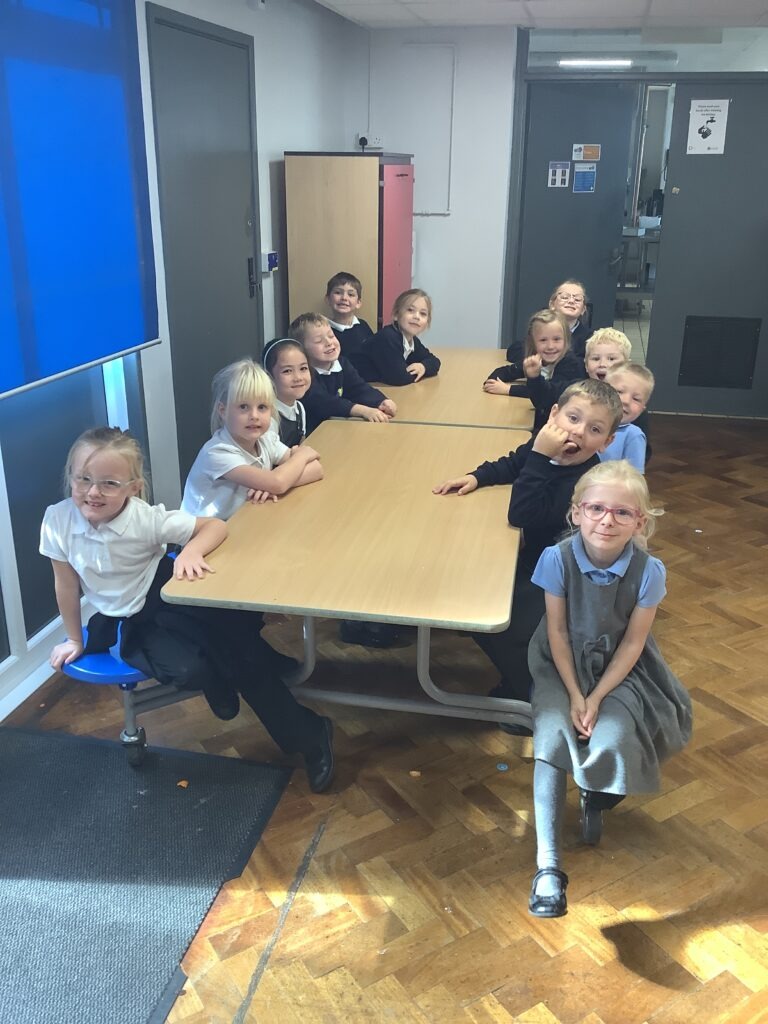
This is a whole group because all the seats have children sitting in them.
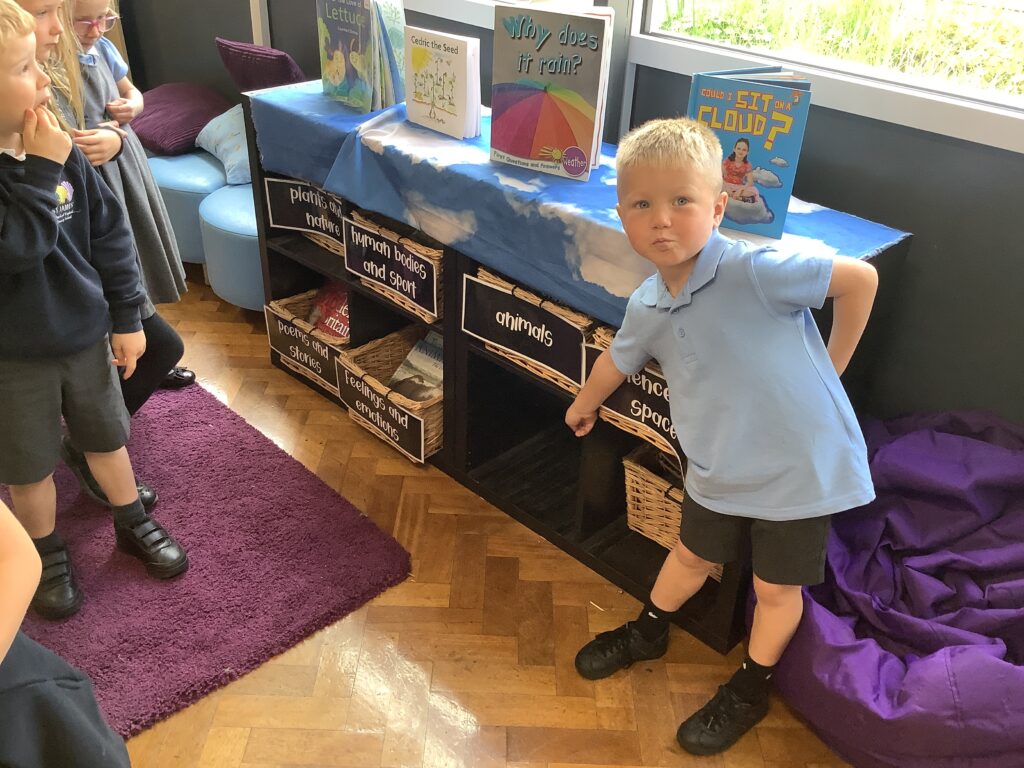
There’s 1 missing. It’s not a whole group.
Help at home by exploring groups of objects:
- At the table, ask your child if the cutlery is a whole group or if something is missing.
- Look in the fridge: is the egg box full? If not, how many are missing?
- When tidying toys, count if you have the whole set.
Reading – The Enchanted Wood
In reading, we’ve been enjoying Enid Blyton’s The Enchanted Wood. We’ve read the first two chapters and met Joe, Beth and Frannie as they moved into their new home near the mysterious wood.
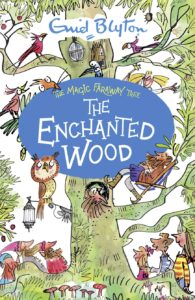
The children have loved imagining what it might be like to discover such a magical place. We’ve been busy making predictions about what could happen next:
- Who might live in the wood?
- What secrets will the children uncover?
- What adventures might be waiting at the top of the Faraway Tree?
Everyone has been eager to share their ideas and it’s been wonderful to see such creativity and excitement in our discussions. We can’t wait to read more and find out what happens next.
Help at home by discussing the story with your child. Can they summarise what has happened so far? Help your child to make some connections – does the story remind them of something they’ve done, seen or read before?
Living and Learning – I use good manners
This week in Living and Learning, Year 1 have been thinking about good manners.
Manners are the kind words and actions we can use to show respect and kindness to others. They help us to treat everyone fairly and link to the British value of respect and tolerance.
We talked about how it feels when people are polite or impolite. Being polite makes everyone feel happy and cared for but being impolite can make people feel sad or left out.
The children had lots of brilliant ideas about good manners:
-
Saying please and thank you
-
Being kind and helping people
-
Holding doors open
-
Sharing
-
Saying good morning and giving a smile
-
Being welcoming to others
We agreed that good manners help us to get on with each other and they make school a happier place for everyone!
Help at home by thinking of a time you used good manners today. How did it make you and others feel?
Topic – Capital Cities of the United Kingdom
This half term, in topic, we’re geographers. A geographer is a type of scientist that studies the world around us. They look at the land and the people on it.
- We live on a planet called Earth.
- We live on a continent called Europe.
- We live in a country called England.
- England is a part of the United Kingdom – a union of 4 countries.
This week, we’ve been learning about the capital cities of the United Kingdom.
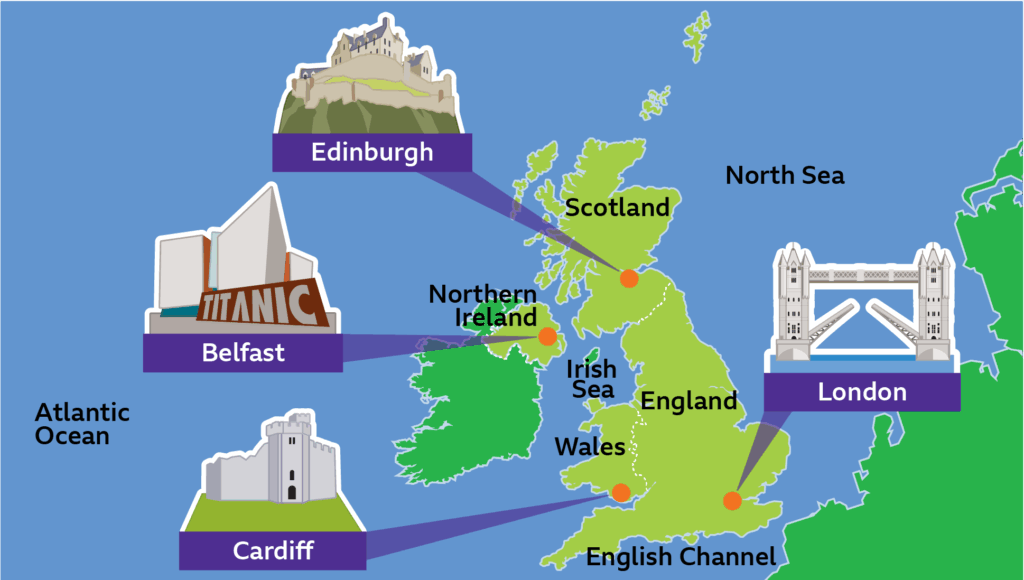
A capital city is an important city which is usually where the government works (they’re the people who make rules and decisions).
After learning about the capital cities of the United Kingdom, the children were tasked with locating them on a blank map and labelling them. We’ve got some impressive geographers in Year 1!
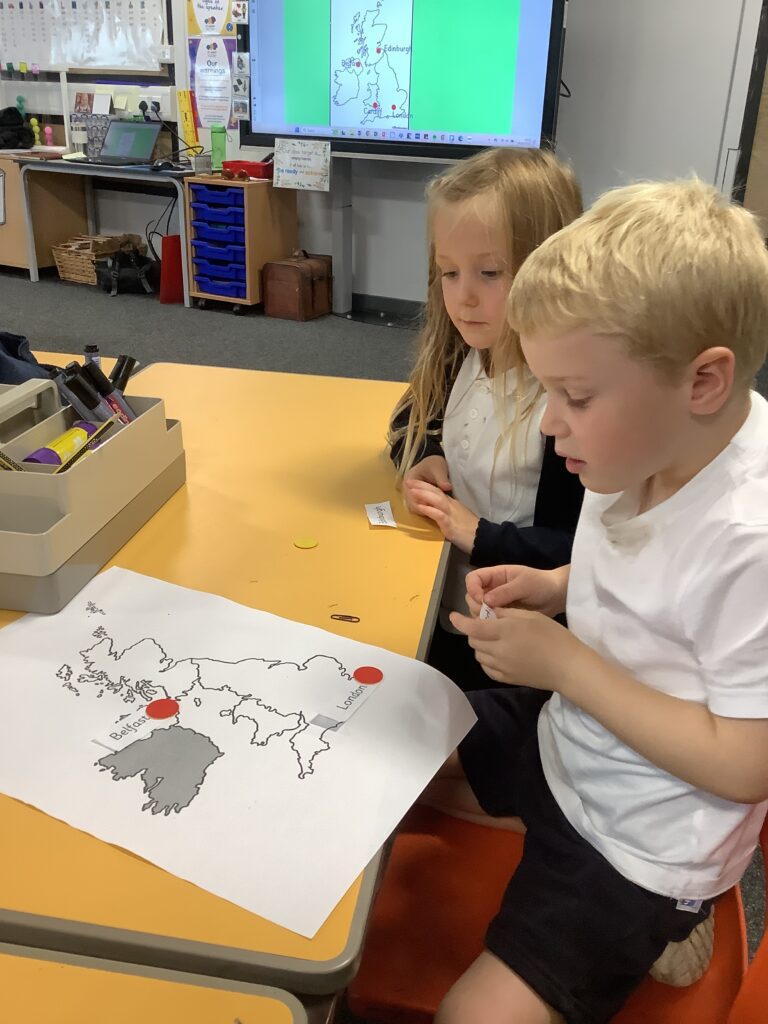
“Belfast is the capital city in Northern Ireland.”
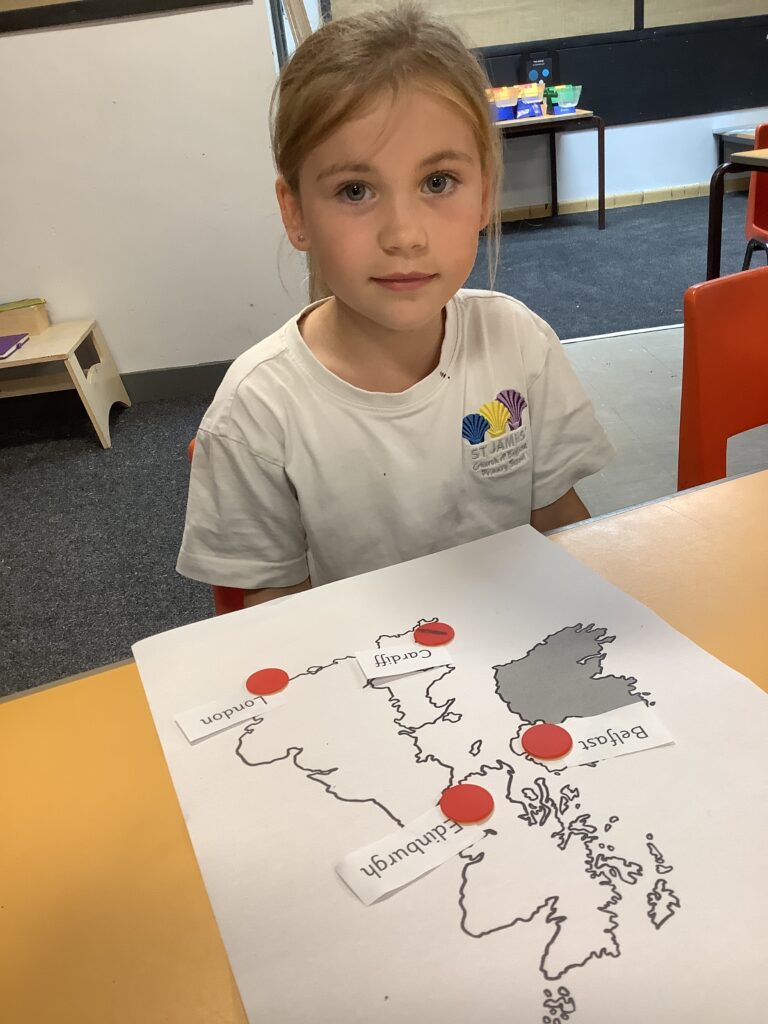
“I’ve been to London.”
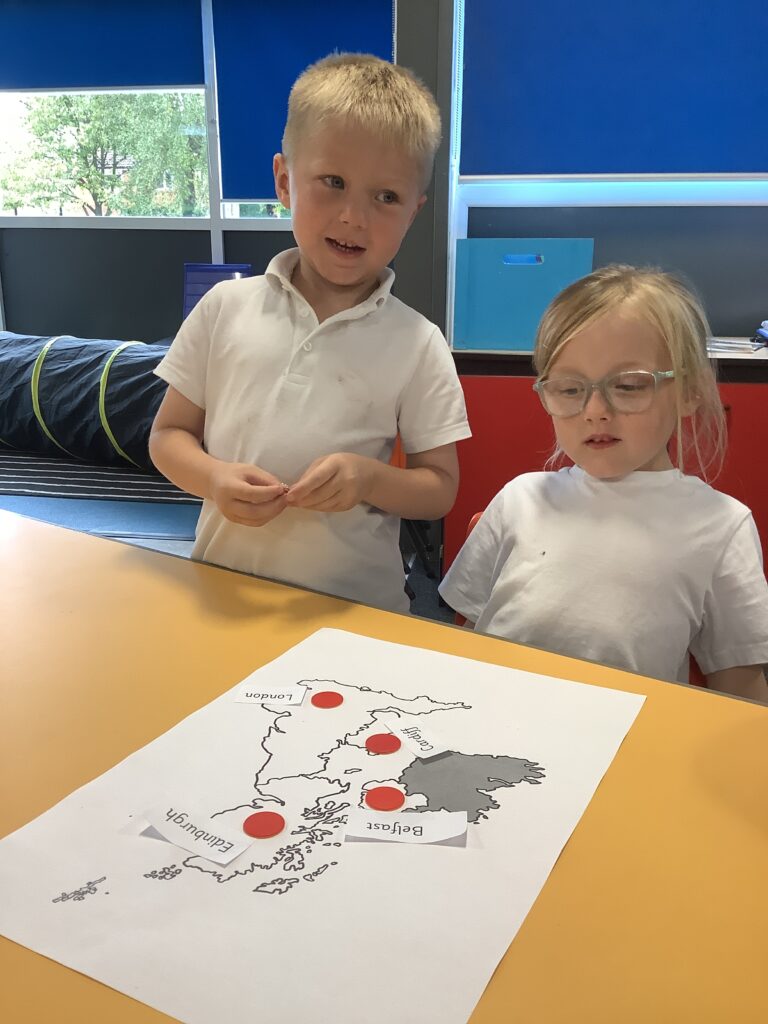
“Cardiff is in Wales.”
Help at home by:
- Map Hunt Find the capital cities of the UK on a map – perhaps in an atlas or on Google Earth.
- Build It Can you build any of the capital cities’ landmarks using blocks or LEGO?
- Travel Talk Have you visited any of the capital cities of the United Kingdom? Tell you child about your trip. What did you see?
Philosophy Friday – What makes a good school?
Philosophy is thinking deeply.
Every Friday, we start our day with some time to wonder and ponder.
We’ve a different question each week – there’s no obvious right/wrong answer and no underlying moral message. All children are given the opportunity to contribute their ideas and give reasons for their thoughts.
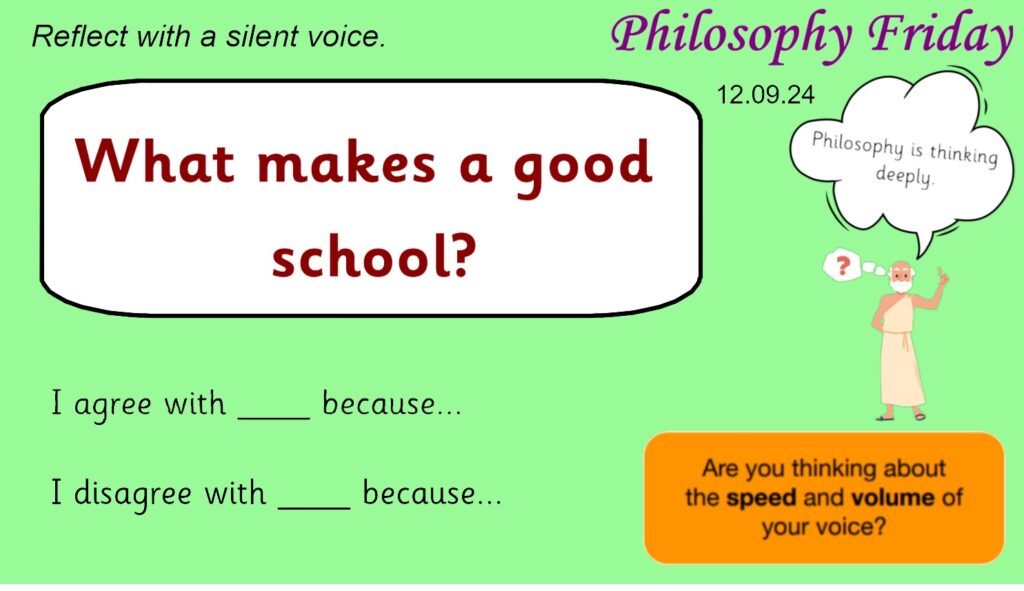
The children had some lovely responses. A good school is a place where:
People are kind to each other.
– ImogenYou can have fun with your friends.
– Ella DYou can learn about numbers.
– DarceyPeople share.
– Arlo
Help at home by discussing this week’s Philosophy Friday question with your child.
Science – Human Body
In science, we’re learning about the human body. So, what makes a human?
Humans are a type of animal made up of lots of important parts. We have brains for thinking, hearts for beating and tummies that rumble at 11:45. We tried to name as many body parts as we could think of. The children really impressed me with their knowledge!
We worked like scientists by carrying out an investigation to answer the question: Do older children have bigger feet?
After making some predictions, we lined our feet up in birthday order and compared. We were surprised to find that the answer to the question was only sometimes. Science can be full of surprises!
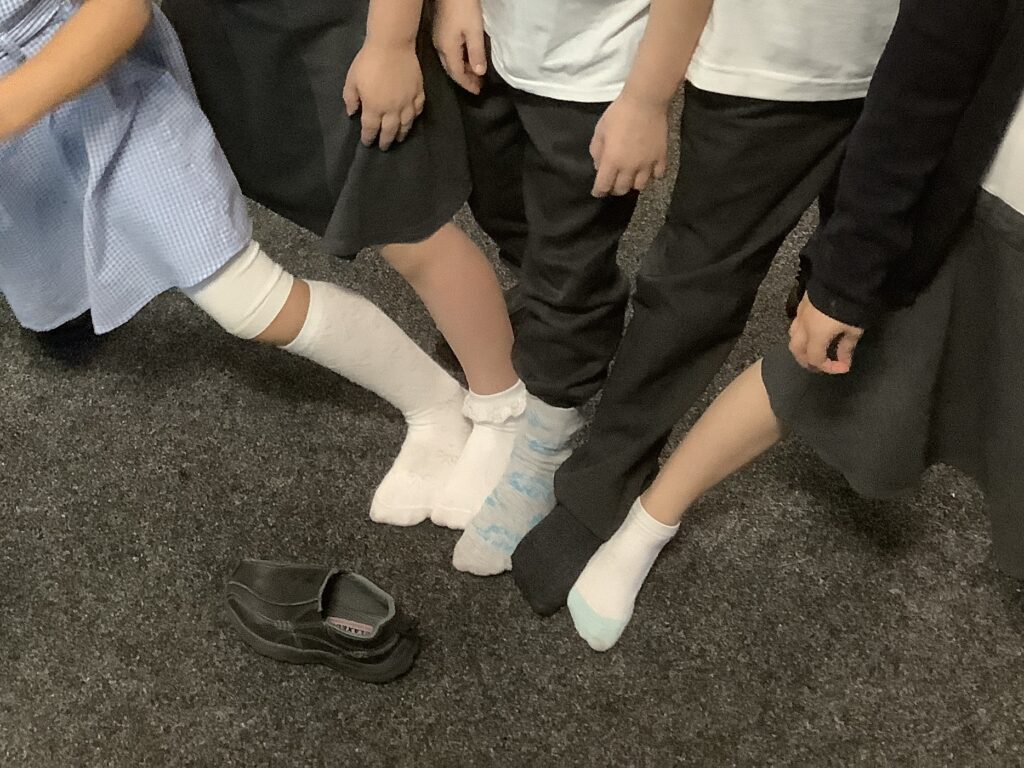
Help at home by discussing parts of the human body with your child. Play Simon Says using body parts to help them remember some of the tricky ones. Re-create our investigation at home by lining up in birthday order and compare foot size.
Reading Records and Library Books
This week, your child has brought home a new reading record and a library book. Log-in details for NumBots are Collins Hub are on the back of reading records. Please let me know if you are having access issues.
Reading Records
Please return a signed reading record by Thursday each week ready to be sent home again on Friday. Each week, please write a short comment about your child’s reading (something that’s gone well, something they’ve enjoyed, something you’d like more support with). This is a valuable stream of communication. I’ll set a target for your child each week which can help to give your home learning a focus.
Library Books
Your child has (almost!) free rein of our school library. We have a huge variety of books for you to enjoy at home. We’ll help steer your child towards something that is age-appropriate and will encourage them to engage with something they’re passionate about. Enjoying library books at home is a brilliant way of learning ‘book behaviour’.
- Exploring books physically – turning pages, engaging in conversation about pictures, some independent reading
- Preference – help your child to develop likes/dislikes in genre, illustration, repetition and rhyme, relatable characters
- Impact – vocabulary, listening skills, developing fluency, link reading to being fun (not just school!), bonding through shared reading
Year 1 will visit the library to return books (and select a new one) every Monday. Please return library books to school by the end of the week – this helps us to smooth out the returns process and makes more time for loving books!
Living and Learning – I Follow the School Rules
Every week, we have a Living and Learning statement (you can find them on the calendar).
To start the school year, our statement is:
I follow the school rules.
We’ve been talking about what it means to follow the school rules. A rule is something that we all agree to follow so that everyone can feel happy and healthy. Rules help us to know what to do and how to behave at school, at home and in the community.
At St James’ CE Primary, we have three school rules.
- We’re respectful
- We’re ready
- We’re safe
The children shared some ideas about how these rules might look around school.
We’re respectful
- we show kindness
- we use good manners
- we listen carefully
- we take care of our belongings
- we look after each other
- we put our hands up to speak
We’re ready
- we come to school ready to learn
- we have silent voices
- we have empty hands
- we have eyes on the speaker
We’re safe
- we make sensible choices
- we walk around school
- we use equipment properly
- we ask for help when we need
When these rules are followed, it helps our school to be a happy and healthy place to achieve and believe. They help us to feel cared for and included.
Help at home by discussing the school rules with your child. Do you have any rules at home? Can you think of any places in the community with their own special rules (perhaps a swimming pool or the library?).